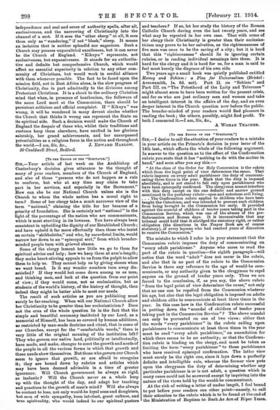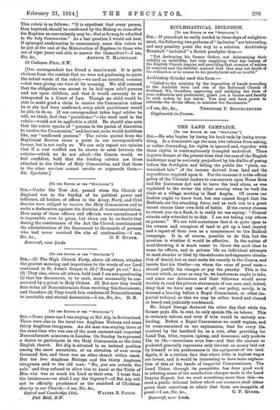(To an Elinor or rez Srscror04 . 7 SI11,—I desire to call
the attention of your readers to a mistake in your article on the Primate's decision in your issue of the 14th inst., which affects the whole of the following argument. In answer to the question as to the effect of the Confirmation rubric you state that it has "nothing to do with the matter in hand," and soon after you any this :— "At the close of the Order for Holy Communion is the rubric which from the legal point of view determines the cause. That rubric imposes on every adult parishioner the duty of communi- cating three times in the year. Mark that the duty is imposed absolutely, and is not stated to fall only upon parishioners who have been episcopally confirmed. The clergyman cannot interfere with this duty except on the one definite and narrow ground mentioned in the prefatory rubric—open and notorious evil living. . . . The Confirmation rubric applies to children who have been taught the Catechism, and was intended to prevent such children from being brought to the Communion too early. It provided against the scandal of children of tender years taking part in the Communion Service, which was one of the abuses of the pro. Reformation and Roman days. It is inconceivable that any tribunal could hold that it abridged the statutory right, or rather obligation (the directions in the Prayer Book are of course statutory), of every layman who had reached years of discretion to receive the Communion."
The mistake to which I refer is in your statement that the Communion rubric imposes the duty of communicating on "every adult parishioner." Anyone who cares to read the part of the rubric in question—the eighth paragraph—will notice that the word "adult" does not occur in the rubric, and also that in no part of the rubric to the Communion Service is there any reference to the age of would-be com- municants, or any authority given to the clergyman to repel anyone on the ground of tender years only. Thus we are forced to the conclusion, if, as you say, the above rubric "from the legal point of view determines the cause," not only that no one can be repelled from the Communion whatever his age, but also that the legal obligation is imposed on adults and children alike to communicate at least three times in the year. In this case how is the Confirmation rubric successful in putting down the "scandal of children of tender years taking part in the Communion Service "? The above scandal can only be prevented on one of two views either that the words "every parishioner" in the rubric calling upon parishioners to communicate at least three times in the year must be read "every adult parishioner," an emendation for which there seems to be no authority; or that the Confirma- tion rubric is binding on the clergy, and must be taken as limiting the term "every parishioner" to those parishioners who have received episcopal confirmation. The latter view must surely be the right one, since it lays down a perfectly definite and intelligible rule, whereas the former view pubs upon the clergyman the duty of determining whether any particular parishioner is or is not adult, a question which in many cases could not be answered except by inquiring into the nature of the views held by the would-be communicant.
At the risk of writing a letter of undue length, I feel bound to put before your readers one other point—namely, to call their attention to the rubric which is to be found at the end of the Ministration of Baptism to Such As Axed Riper T ears.
This rubric is as follows "It is expedient that every person, thus baptized, should be confirmed by the Bishop so soon after his Baptism as conveniently maybe; that no he may be admitted to the holy Communion." As a last question I would ask how, if episcopal confirmation be unnecessary, came this rubric to be put at the end of the Ministration of Baptism to those who are of riper years and able to answer for themselves ?—I am,
Sir, &c., ARTHUR T. MACMILLAN. 52 Cadman Place, S.W.
[Our correspondent has found a mare's-nest. It is quite obvious from the context that we were not professing to quote the actual words of the rubric—we used no inverted commas .--but were giving our view of its meaning. We still contend that the obligation was meant to be laid upon adult persons and not upon children, and that it would certainly be so interpreted in a Court of Law. Though no child would be able to make good a claim to receive the Communion unless he or she bad been confirmed, every adult parishioner would be able to do so. If our correspondent takes legal advice he will, we think, find that "parishioner "—the word used in the rubric—would not be applied to a child. He should also note that the rubric speaks of "persona in the parish of discretion to receive the Communion," and does not, as he would doubtless like, say "confirmed persons." The rubric quoted from the Baptismal Service seems a point in our correspondent's favour, but is not really so. We can only repeat our opinion that if a real conflict can be shown to exist between the rubrics—which we do not admit—the Courts would, we feel confident, hold that the binding rubrics are those attached to the Order of Holy Communion, and that those in the other services cannot revoke or supersede them.— En. Spectator.]















































 Previous page
Previous page